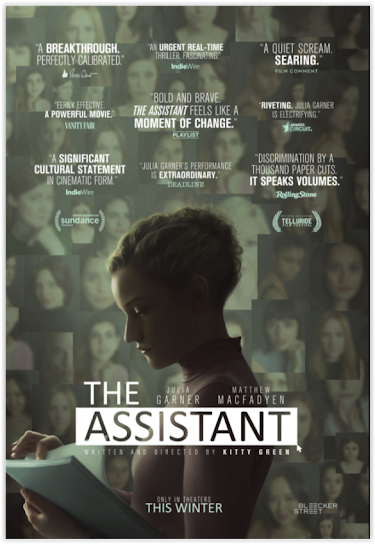The long shadow of Harvey Weinstein
Tuesday, April 5, 2022
Kitty Green’s The Assistant has been credited by some as the first feature-length fiction film that tackles the topic of Me Too and Time’s Up. It’s an unsettling portrayal of life in the trenches for one lowly underling working in the film production business and the extent to which women are subjugated and exploited in this industry. This movie got the full CineVerse treatment last week, which resulted in a lengthy discussion, the highlights of which are included below (to listen to a recording of our group conversation, click here).
What struck you as memorable, unexpected, impressive, or otherwise about The Assistant?
- The ending is unresolved and abstruse. Perhaps we expected Jane to take the moral high road and quit, lodge more formal complaints about her boss in-house and to the authorities or the media, or get fired for doing so. Instead, the movie suggests a much more realistic conclusion: The assistant probably ignores the problem henceforth and benefits by moving up the corporate ladder. After all, this is what most workers and enablers do who are privy to unscrupulous acts by their superiors, and this is why many workplace predators get away with it.
- To the film’s betterment or detriment, most of the scenes shown and events depicted are relatively mundane and unexciting as drivers of the plot. We follow one day in the life of an entry-level worker and witness the minutia and humdrum aspects of her job and the occasional small details that signify much bigger underlying conflicts.
- Film critic Sheila O’Malley wrote: “So many films over-explain themselves, so many scripts make sure they lead us by the hand, so many films don't trust us as viewers. In Bombshell…Fox News commentator Megyn Kelly (Charlize Theron) looks right at the camera, telling us how things operated at the network. In the same film, Kate McKinnon's character also has a monologue, looping us into the modus operandi of that hermetically-sealed sick world. These monologues ‘catch us up.’ The Assistant doesn't go that route, and it is a far stronger film for it. Instead, we just hear the whispers, murmurs, snickers; we hear the tail-end of conversations and we put two and two together, just as Jane does. We know that an earring on the floor isn't enough to bring down a bad man. But we also know that Jane senses correctly. Something is very very wrong.”
- Interestingly, we are never shown the boss in full, or his face, or given his name. This allows us to use our imaginations and project any face and name we choose upon the character. We can deduce that he is a Harvey Weinstein-like figure who is physically unhealthy (a diabetic who needs insulin), tyrannical, and terrifyingly powerful. Before making this film, director Kitty Green carefully interviewed people about the work culture at Miramax, Weinstein’s film production company; the office and the boss are modeled on Miramax.
- There is very little musical accompaniment. Occasionally, a quiet score will surface to underscore the emotional conflict felt by Jane and us.
Major themes
- The moral imperative to seek justice for a suspected wrongdoing or crime. Jane strongly suspects that her boss coerces young women to engage in sexual activity in exchange for favors, hirings, and other perks. Her option of immediate recourse is to bring the matter to the attention of human resources, but she quickly learns that they are in the predator’s corner, and she will be punished or fired for lodging a formal complaint.
- Evil is allowed to persist when good people do nothing. This is primarily a film about the culpability and complicity of enablers who turn a blind eye to higher executives and employers' predatory and manipulative behaviors. At this film production company, Jane may be at the bottom of the hierarchical totem pole, but she feels an obligation to speak up about perceived sexual impropriety. However, she backs off from her complaint when she realizes the price she will have to pay for pursuing justice: being fired and likely blackballed from the film industry.
- The challenges of being an entry-level worker and a woman in a male-dominated business. The Assistant goes to great length to show us, with even the minutest of details, how soul-sucking, demeaning, and demanding her job is. She’s the first one in and the last one out, often performing duties beyond her pay scale and skill set, such as serving as a housekeeper, interfacing between the boss and his angry wife, and functioning as foul play fixer and arranger.
- The degree to which you are willing to compromise your principles, integrity, and ethics for career advancement. By the end of the picture, Jane has apparently decided to suck it up and remain silent and continue to work for a despicable boss and a shady company where everyone else is also aware of the dirty deeds being committed by the man in charge. She will likely suffer innumerable indignities, belittlements, beratement, and crises of conscience under his command but probably will eventually become the producer she aspires to be while never being sexually victimized by the boss.
- Toxic masculinity and unhealthy corporate culture.
Similar works
- Bombshell
- Never Rarely Sometimes Always
- On the Record
- The Reckoning: Hollywood's Worst Kept Secret
- Untouchable
- Oleanna
Other films by Kitty Green
- Ukraine is Not a Brothel
- Casting Jon Binet




